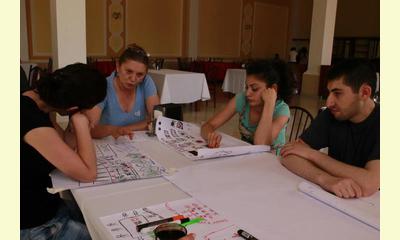|
|
Youth Mobilization: Meeting in Tbilisi
un article par UNOY - United Network of Young Peacebuilders
On June 6-13, a meeting on youth mobilization was held in Tbilisi, Georgia. The meeting was attended by 23 participants from Vanadzor (Armenia), Yerevan (Armenia), Stepanakert (Azerbaijan), Baku (Azerbaijan), Sanski Most (Bosnia and Herzegovina), and Berlin (Germany) who were interested in peace-building. The meeting was organized by Vanadzor’s Peace Dialogue NGO and its German partner OWEN. The guests from Sanskiy Most, presented to the participants the experience of their organization, the Center for Peacebuilding (CIM), in the peace-building field. They described the history of the foundation, shared their own personal stories from during and after the war in their country and described what made them found the organization and participate in the meeting.

click on photo to enlarge
Furthermore, Peace Dialogue and the Center for Peacebuilding (CIM) also represented their strategy on youth mobilization, the actions that have been implemented, and their experiences. After that, the participants discussed what can be used from the presentation in daily life in their communities.
Marina Grasse from OWEN observed, “This was my first such meeting and I was very happy to see that, despite the tension at the beginning, at the end of the meeting some participants thought about future joint co-operations and joint initiatives.”
Peace Dialogue NGO director Edgar Khachatryan mentioned that the participants who are interested in Peace Dialogue’s Let’s see… Let’s choose… Let’s change… project and are eager to join together with their efforts will be invited to a second workshop. In that workshop, the participants will be introduced to the tools of the Theatre of Oppressed as a means to form critical thinking skills and motivate young people.
You can find photos of the meeting here.
|








|
DISCUSSION
Question(s) liée(s) à cet article:
Is there a renewed movement of solidarity by the new generation?,
* * * * *
Commentaire le plus récent:
from Javier Collado Ruano, Director of Edition at Global Education Magazine, on the occasion of the International Day of Solidarity.
Solidarity is a trans-dimensional phenomenon that goes beyond the ontological essence of human nature. In fact, when we analyze the connections between the microcosm and the macrocosm, we perceive that human beings are not involved in chaos and arbitrariness, but belongs to the large network of interdependencies, complementarities and reciprocities that constitute life. The emergence of life on Earth, around 3,8 billion years ago, was a complex process of exceptional natural phenomena, inherent in all living systems. A process which is expressed through unlimited creativity: mutation, gene exchange, and symbiosis. From a cosmo-biological perspective, we can understand a new conceptual dimension of life, where all living beings share same basis of genetic code: the twenty amino-acids and four phosphatic bases. In fact, the diversity of living beings is caused by the combination of this cosmo-bio-genetic basis.
This trans-dimensional perspective has a deep ecological and spiritual sense for our worldview because the human evolutionary adventure is the latest stage of life on Earth. The modern human being is a vertebrate animal, mammal, belonging to the primates, which emerged 200,000 years ago. In recent centuries he has imposed its anthropocentric, industrial and capitalist vision to the detriment of Pachamama (and Indigenous goddess known as earth mother). We consume around 120% of the natural resources that Earth Mother regenerats annually. Our consumer behavior is immersed in a fatalistic dynamic with a destiny to climate change (deforestation, loss of biodiversity, ozone, etc.), and our own self-destruction as a species.
There is an urgent need to get beyond the cognitive fallacy that the mental structures of social Darwinism and capitalist postulates of the 19th century have historically constituted, because they only understand natural and social systems as warmongers and competitive processes whereby species diverge from each other. . ... continuation.

|
|









